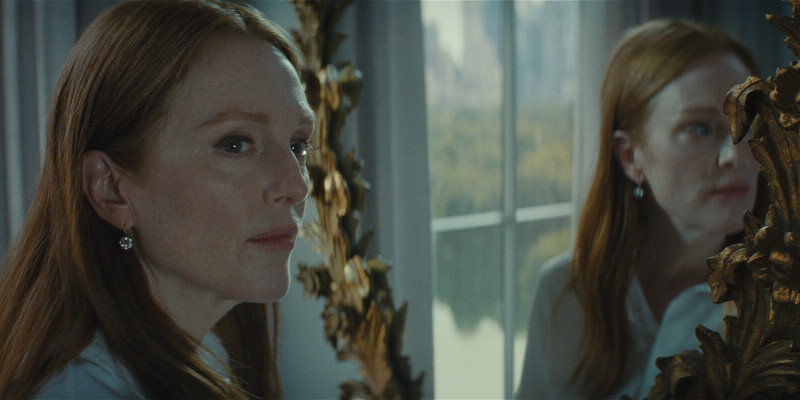
Review by
Eric Hillis
Directed by: Benjamin Caron
Starring: Julianne Moore, Sebastian Stan, Justice Smith, Briana Middleton, Darren
Goldstein, John Lithgow

It's easy to imagine a 1980s version of Sharper directed by
Adrian Lyne with a screenplay by David Mamet and a score by Giorgio Moroder.
Its drama plays out in the world of Manhattan elites, a milieu that seems
permanently stuck in that excessive decade. Every time a camera glides
through some multi-millionaire's high-rise apartment it always feels like
we're watching a Paul Schrader movie from 1983. It's only a matter of time
before shoulder pads make a return.
Had Sharper been made by the likes of Schrader, Mamet or Lyne
four decades ago it may not have been a better movie but it no doubt would
have been more interesting. Sharper is about con artists,
people who put on a deceptive front to lure in unsuspecting marks, and the
movie itself does likewise. It's superficially sleek and sexy, which
mainstream American movies rarely are today, and for much of its running
time it causes you to lean in as it peels back the layers of its tale. But
once a certain amount of layers have been peeled it reveals itself as hollow
and derivative. Few recent movies have had such a gulf between a gripping
first half and a shrug-worthy second half.

The deception begins with an opening meet cute between depressed young
bookstore owner Tom (Justice Smith) and Sandra (Briana Middleton), a suspiciously pretty and charming student who agrees to accompany him
for a meal at a nearby restaurant. Tom is immediately smitten and soon he's
opening up both his heart and his store's cabinet of rare books. It's as
convincing as any rom-com setup, but of course this is a thriller. Director
Benjamin Caron, writers Brian Gatewood and
Alessandro Tanaka, and Smith and Middleton do a fine job of selling
the deception however, and so when one of the young lovers is screwed over
financially by the other it's a sharp reminder that this is very much an
anti-romance.
Sharper may not have romance on its mind, but it is sexy, particularly when we
flashback to a Pygmalion-esque storyline that sees suave con-man Max (Sebastian Stan) take Sandra, now a junkie known as Sandy, under his wing and train her in
the art of the con. Think of Walter Pidgeon and James Coburn teaching
Michael Sarrazin and Trish Van Devere how to be professional pickpockets in
Harry in Your Pocket, but with sexual tension (come to think of it, Van Devere plays a
character named Sandy in that movie too...hmm). As we watch Sandy become
Sandra, going from tough-talking street rat to a glamour queen capable of
seducing married men in hotel bars, we're also watching newcomer Middleton
become a bona fide movie star. Were it not for the subsequent introduction
of Julianne Moore, Middleton's later absence from the second half
might be more damning.

Moore shows up as Madeline, another con artist inveigling herself into the
heart of multi-billionaire Richard (John Lithgow), who happens to be
Tom's father, and also happens to be suffering from some terminal illness.
As the film moves towards a clichéd climax that sees a gun drawn, it becomes
less interested in its characters and too caught up in how it's going to
neatly wrap everything up.
Sharper wildly overestimates how much we care about the
victims of its con artist antagonists. Sure, it sucks that Tom has his heart
broken, but haven't we all at some point? The difference is we don't have
millions in our bank accounts to console ourselves with. Similarly, it's
impossible to give a damn about Richard. The source of his wealth is
ambiguous, but let's face it, you can earn thousands, maybe even millions,
but billions can only be stolen. Besides, Madeline's deception is giving him
a pretty good deal, allowing him to live out his final days with an
attractive, younger woman who makes him happy.

So too does the movie underestimate how much we might end up rooting for
its nominal villains. The reason the crime genre is so enticing is that it
allows the viewer to vicariously live out a fantasy of throwing off the
shackles of decency and imagine living outside law and morality for 90
minutes or so. We root for the anti-heroes of crime thrillers despite our
own ethics, because we're secretly jealous of their disregard for societal
norms. There's also something satisfying about watching people who are very
good at what they do, even if what they do is illegal and immoral. We want
Max, Madeline and Sandra to succeed because they're very good at being con
artists, and it's natural to want to see people rewarded for good work. But
Sharper doesn't seem to grasp any of this and instead thinks
that we're going to feel sorry for the elites who live in the clouds above
Manhattan.
It may end in a thoroughly unsatisfying manner, with a "crime doesn't pay"
coda that belongs in a Hays Code-era gangster picture, but for its first two
thirds Sharper is a genuinely thrilling thriller, populated by
charismatic stars playing people whose livelihood depends on charisma.
Nobody fucks in Hollywood movies anymore, but the characters here at least
seem like they possess libidos. In these oddly chaste times, that's
something.

Sharper is on Apple TV+ now.

